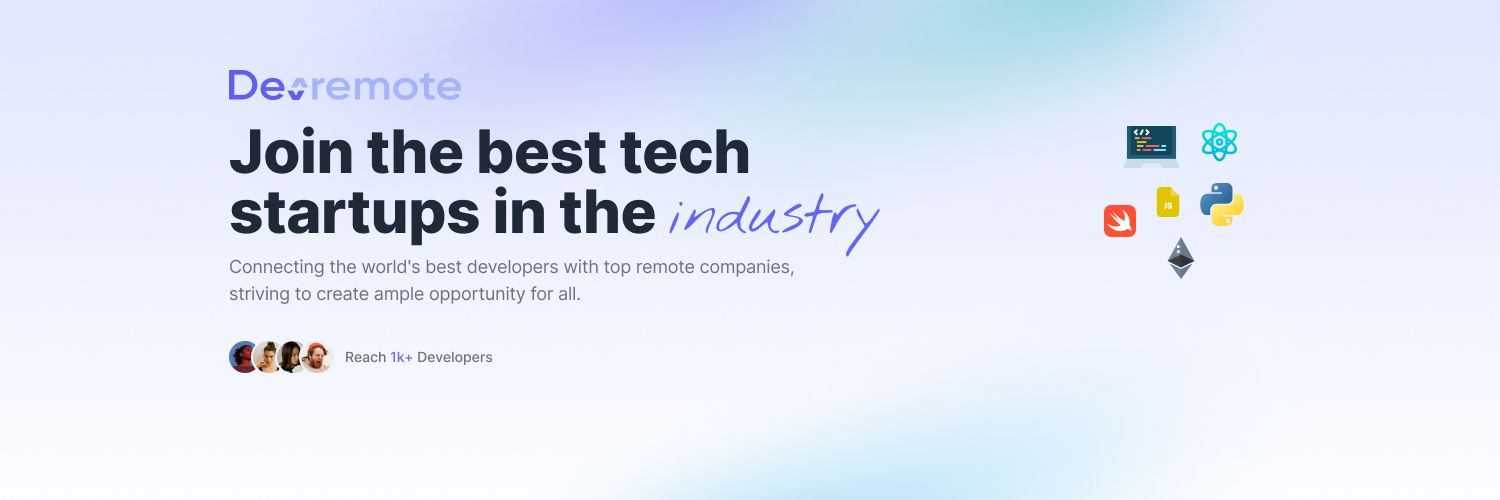As the world continues to adapt to the new normal of remote work, the demand for remote developers has never been higher.
Companies are now realizing the benefits of hiring remote workers, including cost savings and access to a wider pool of talent.
If you're looking for a remote developer job in 2023, here are some tips to help you land your dream remote developer job.
I have been working remotely as a developer for many years now. In this article I'll share my experiences and advice with you so you can take advantage of the latest remote work trend.
Focus on Networking
Network, network, network. Networking is key to finding any job, and remote developer jobs are no exception.
Join online communities, attend virtual events, and reach out to people in your network to let them know you're looking for a remote developer job.

I have done this countless times throughout my carer. Attending meet ups has brought me great success, and helped me get my latest developer role as a Software Engineer at a remote blockchain start-up. I even got to go to Italy for an off site meet up (where I enjoyed lots of good food and drink).
If you have a limited network, I can't stress enough the value in reaching out to start up founders on platforms such as LinkedIn. It is literally there for the purpose of professional networking, yet hardly any developers I have met use it for this.
Key Networking Takeaways
- Networking can significantly increase your chances of finding a remote developer job.
- Use platforms such as LinkedIn and meetup.com to start out on your networking journey.
Brush Up on Your Skills
As with any job – and even more so with tech – staying current with the latest technologies and trends is essential to landing a remote developer job.
Consider taking online courses or earning certifications to demonstrate your commitment to staying up-to-date.

It can also benefit you if you add some projects to your portfolio that utilise the skills you learn along the way. You can use these to sell yourself when it comes to interviews.
For example, I have built out a few projects lately that use Prisma, which is becoming a popular ORM for working with Postgres and NodeJS. I used the projects to sell myself during interviews and highlighted how I can use it, what I learned, and how I can add value to the company that is interviewing me immediately.
To find out what the latest tech trends are, note down the most common requirements in job descriptions. Go through a few interviews and see what they want to talk about, then simply adapt once you discover what those in-demand skills are.
This is helpful, because while there are a lot of cool technologies out there, many of them might not be helpful when it comes to getting a job. Most companies primarily use tried-and-true solutions that have been around a while. Even when they do use new tools, it's rarer.
By learning these key new skills, not only will it benefit you immediately but it will show any company looking to hire you that you have a desire to learn and constantly improve. This is something that will seriously help your chances of securing a remote position as a software engineer / developer.
Key Skills Takeaways
- Learning the most in-demand tools and technologies and keeping up to date will significantly enhance your chances of getting a remote developer job.
- Create projects that you can use to sell yourself and talk about. This is so valuable when it comes to showcasing the value that you can bring to a company.
Customize Your Résumé and Cover Letter
When applying for remote developer jobs, it's important to tailor your résumé and cover letter to the specific job and company you're applying to. Make sure to highlight any relevant experience you have and how it makes you a good fit for the position.

To customize your résumé and cover letter, you should first research the company and position you are applying for. Look at the job description and requirements, and make sure that your résumé and cover letter highlight your relevant skills and experiences that match what the company is looking for.
Additionally, use language and terminology that is specific to the industry or field you are applying for. You may also consider including specific examples or accomplishments that demonstrate your qualifications for the position.
For example, if you are applying for a remote job at Stripe, you need to go and do some research on the tech stack, values, basic info, vision and mission of Stripe. Really get to understand the company you are applying for as this will come across in your résumé and cover letter.
Aside from this, think about what the person reading your résumé is looking for. Not only do they want to see your skills, values, and carer highlights but they also are going to be looking at how hiring you will mitigate the risks that come with hiring engineers.
Recruiting talent is expensive for a company, so as a result they want to know that hiring you is not going to be a big risk. So make sure that you present the relevant details in your résumé / cover letter.
Finally, think about the core aspects of remote work and how soft skills such as communication, ability to work independently, and honesty are of huge value. Try to demonstrate these traits during interviews.
Key Résumé and Cover Letter Takeaways
- Tailor your résumé and cover letter for both remote work and the company you are applying to.
- Highlight points and skills that will help the employer see how hiring you will be a low risk investment.
- Cover how you can add value straight away.
Use Developer-Focused Job Boards
Job boards are a great way to find remote jobs. But most of them out there are tailored to a broader audience, so sometimes they can make it harder to filter out jobs you don't want.

Not only this, but the competition is higher. Instead, using niche job boards for developers is a great way to lower the completion you will be facing but also find incredible opportunities at the same time.
I personally use a variety of different job boards to help me find roles. Here is a quick list of the job boards I use and recommend:
- Devremote (Every type of developer job)
- Web3.career (Web 3 specific)
- 4dayweek.io (In the name, four days a week jobs)
- remotefrontendjobs (Frontend only jobs)
- RubyOnRemote (Ruby jobs)
- jobsinjs (JavaScript jobs)
All of these job boards are awesome and I love using them.
Quick tip here - I recommend finding the jobs using these job boards, then searching for the company on LinkedIn and contacting the CTO / People in charge of recruitment. This can help you get yourself ahead of everyone else. I do it all the time and it works really well, as very few people do this kind of thing.
Key Job Board Takeaways
- Use niche job boards with a developer focus. They provide much better opportunities and have filters that are aimed at engineers/developers.
- Reach out to people in charge of recruitment via LinkedIn.
Conclusion
Utilising the ideas in this article has helped me land many interviews and job offers from remote-first tech companies over the last four years. I would recommend them to anybody who is serious about getting a remote developer position.
Don't get me wrong, getting a remote developer job can be challenging. But given the way the world is heading and the eagerness of companies to cut costs where possible, remote work is here to stay. That is welcome news for us developers who now have more opportunities than ever to build a flexible and awesome life.

